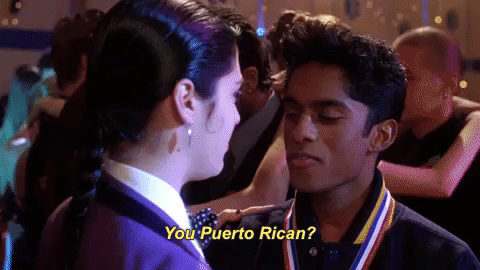
Yesterday, a coworker asked me if I spoke Spanish...
Hello awkward, my old friend.
I never know how to respond to this question since the answer isn't very simple. The short answer is yes, but not very well at all. Sure my accent is pretty good and I can understand what's said to me, but I rarely respond in Spanish.
So I usually just say no, not really.
But the bigger story here is that I am, as a thirty something year old American of Puerto Rican descent, neither alone or unusual. There are many Puerto Ricans like me, and the reason why is an interesting facet of American history.
Changing "Ownership"

The American invasion of the Spanish Province known as Puerto Rico ended with the Spaniards ceding much of their territories in the Caribbean. Though there were Puerto Ricans who had moved to the United States of America already, they were considered citizens of Spain.
So in 1898 when the Treaty of Paris officially ceded the island to the United States, a military government of Americans was installed and the 'Americanization' of the island began.
For a couple of years only English would be taught in school, leading to increased drop out rates among those suddenly faced with adopting and entirely new language to function in their own economy. And while the military rule ended in 1900, the United States demanded that the civilian government of Puerto Rico be composed of Americans only.
And it wouldn't be until 1917 that legislation known as the Jones-Shafroth Act would grant U.S. Citizenship to residents born on the island, while also reorganizing the governmental structure to something akin to a traditional American state.
But the 1950's is when the greatest wave of Puerto Ricans migrated to America.
Mass Migration Meets Majorities

With the rise of air travel, nearly half a million Puerto Ricans migrated from island to mainland, many settling in New York City.
Better opportunities and economic conditions drove many to seek the fabled American dream, but what they found was a population that treated them differently on account of their poor english.
Even though many of those migrants had been full United States citizens upon migration to the mainland, they were treated as second class citizens by the majority. The stigma associated with not speaking English was very strong, and the desire for that first big wave of migrants was that their children should know English no matter what.
As a first generation mainland American, my mother naturally picked up English in society and Spanish from her mother and Grandmother, who largely spoke only Spanish.
Do You Even Spanish, Bro?
Puerto Ricans have a unique American experience because of the nature of our relationship to the United States, and how early it really started. The island has been under United States rule since the invasion of the late 1800's that led to the Spanish withdrawal.

Second Question: Do you speak Spanish?
The people in the first mass migration from Puerto Rico to America, like my Grandparents, experienced major culture shock. They impressed upon their children the importance of speaking English and those children, like my mother, often served as translators for their Spanish-only relatives.
Growing up, my mother seemed to switch between English and Spanish seamlessly. When she didn't want me to know what she was saying, she'd speak quickly in Spanish. If she was upset or yelling at me for being a crazy kid, it would be in Spanish. But for everything else, she used English and so did her kids.
But I do practice as often as I can, and my Spanish is always improving.

So... yeah... I'm Puerto Rican. Do I speak Spanish? ...kinda, not so much.
Why not? uh...
...Well...

Haha you're one of those. Great historical insight though. I don't judge, I can't imagine the struggle of migrating to America. I was fortunate enough to be born here and not have to deal with that burden.
Yep, i'm one of those haha. I think about what that must be like as well, migrating to America. It was such a different world that it's hard to appreciate the difficulty migrants and immigrants went through
Some history here that many of us don't even realize
I wish I would have had the opportunity to learn another language as a child. I often feel like an ignorant American when I travel and meet people who speak 4 or 5 languages.
It's all good. I have a lot of Puerto Rican friends I grew up with on Long Island that don't speak a lick of spanish.
Glad to learn more about you. I confess, when I read about Puerto Ricans moving to New York, I thought, "Oh yeah, West Side Story."
Haha, it seems like most people think that instinctively :)
Excellent post, this opens my eyes and broadens my understanding, thanks!
I'm glad you found it an interesting read, thanks for reading and commenting!
I always wonder why people who grew up in bilingual households are so often not bilingual... I guess it depends on whether the family places an emphasis on that.
the real unfortunate part is that kids are able to pick up multiple languages so easily and it only gets harder from there